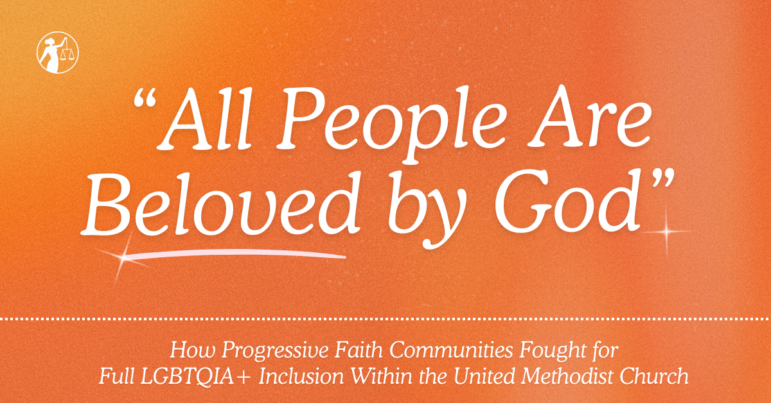Decades of defiance and advocacy finally led to the United Methodist Church officially striking anti-LGBTQIA+ language from the Church’s official guidelines, called the Book of Discipline, in May 2024.
The removal caused a historic split, with more conservative members and congregations choosing to affiliate with the Global Methodist Church and more progressive factions remaining within the United Methodist Church.
Long before the split, many in progressive faith spaces across the county and right here in Texas chose to push against harmful UMC guidelines banning same-sex marriage and LGBTQIA+ clergy by creating openly inclusive spaces for LGBTQIA+ people at their own congregations. At the same time, they fought for official, full LGBTQIA+ inclusion within the wider United Methodist Church.
We sat down with Reverend Teresa Welborn, the senior pastor at University United Methodist Church in Austin, which is currently going through our Just Texas program’s Reproductive Freedom Congregation designation, to talk about the split and why faith values demand we fight for inclusion and justice.
All people are beloved by God. As people following Jesus, we encounter Jesus in the scriptures and through our own life experiences. Jesus always drew the circle of inclusion wider and had a heart of wanting to connect with people who were underrepresented in society.
So when we look at what’s happening in our world through that lens, how can we not be concerned for the harm that’s being done to members of the LGBTQIA+ community, immigrants, and refugees?”
Rev. Teresa Welborn (she/her)
Senior Pastor at University United Methodist Church in Austin, TX
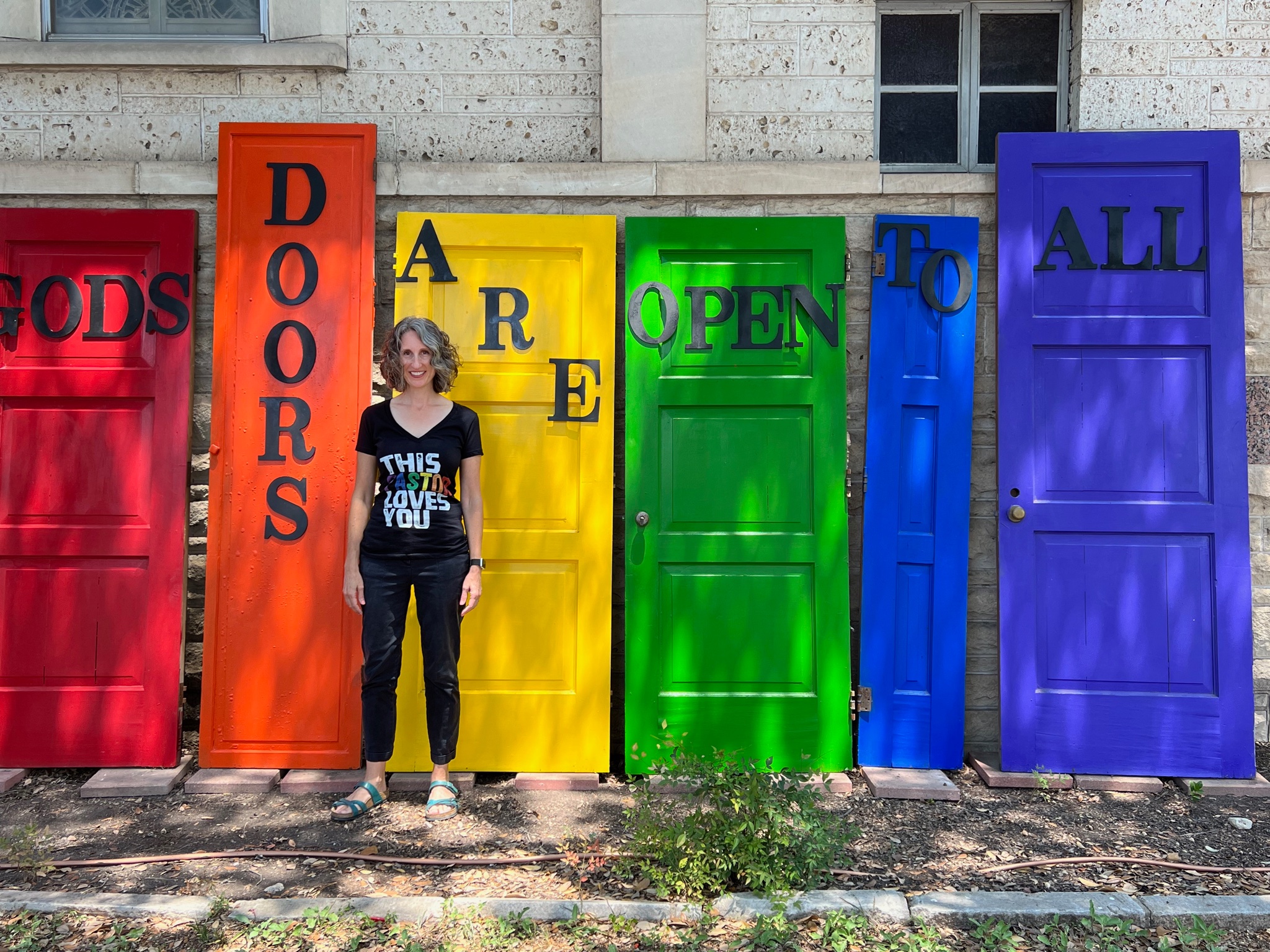
How are official changes to the denomination’s guidelines made?
[The process] for changing United Methodist Church (UMC) guidelines happens at the General Conference. The General Conference is made up of representatives from across the world, and they are the only official body that speaks for our entire denomination or updates our Book of Discipline—the official book of guidelines for UMC congregations.
We were founded after the Revolution, so in many ways, our governing bodies mirror the governing bodies of the United States federal government.
What were the United Methodist Church’s guidelines on LGBTQIA+ inclusion before they were updated earlier in 2024?
Let me explain a bit more about where our official guidance around LGBTQIA+ inclusion came from.
As I mentioned, our entire denomination is guided by the Book of Discipline, and inside of the Book of Discipline is a section called “Social Principles,” which are not church law but seeds for conversation around social issues, including public school, immigration, etc.
And so, in addition to the exclusive policies in the Book of Discipline that said clergy shall not perform same-sex weddings and that openly LGBTQIA+ people shall not be ordained, The Social Principles also contained harmful language. Specifically, it stated, “Homosexuality is incompatible with Christian teaching.”
As time went on, many progressive congregations resisted this piece of the social principles and began to organize and advocate for the language’s removal.
Can you tell me a bit about the United Methodist Church’s split and what led to it?
We’re a global denomination that’s trying to be democratic.
Within the United Methodist Church (UMC) there’s always been diversity of thought regarding LGBTQIA+ inclusion, including in the United States. But when you have a lot of churches in places like Africa, where being openly LGBTQIA+ is illegal, [changing the UMC’s guidelines] gets complicated quickly.
Over time, people on the left and right of the issue moved further and further to each side, and things came to a tipping point. For the most part, a lot of conservative clergy and General Conference delegates began leaving and created the Global Methodist Church, and that change allowed harmful language about LGBTQIA+ people to be lifted.
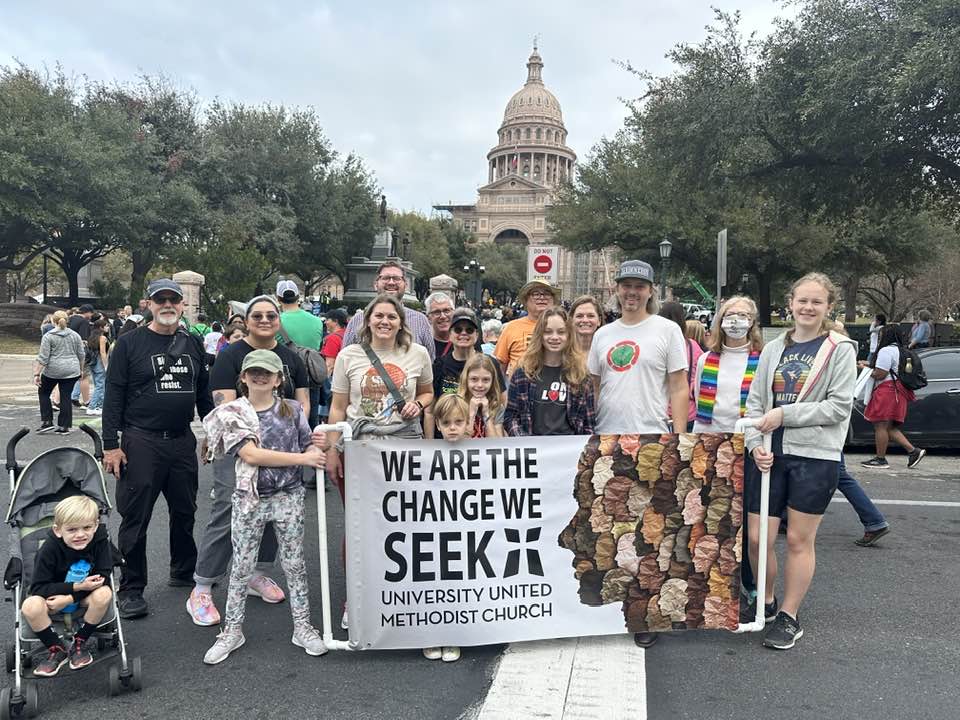
Before the United Methodist Church’s governing body lifted the ban on LGBTQIA+ clergy and marriage, how did progressive congregations like yours actively and intentionally champion LGBTQIA+ equality?
I’ve been at the University United Methodist Church for about three and a half years now.
Long before I was here, the congregation was committed to being inclusive and resisting the harmful language that was in our denomination’s Book of Discipline.
In February of 2011, after a lot of prayer, discernment, and conversations with different groups in the congregation, we voted overwhelmingly to affiliate with Reconciling Ministries Network.
Reconciling Ministries Network (RMN) is a UMC caucus organization that was passionately advocating and lobbying for more inclusive language in our Social Principles and for the harmful language to be lifted out of them.
For example, when we’d gather every four years at the General Conference, RMN was one of the instrumental groups advocating for change—wearing rainbow stoles and holding civil protests at the General Conference, as a way of witnessing and trying to push the body forward.
Even individuals or small groups like Sunday school classes could affiliate with the Reconciling Ministries Network, so it could also be a way to challenge the larger congregation.
Through the years, affiliating with RMN became a way of saying, “We do not agree with the harmful language regarding LGBTQIA+ people in the Church, and we are advocating for full inclusion in all aspects of the Church.”
Another thing that turned up the heat on making changes to the Social Principles was the amount of clergy coming through the candidacy process who chose not to hide that they were LGBTQIA+ as a matter of integrity and authenticity.
We had many Bishops choosing to allow LGBTQIA+ clergy and choosing to allow our clergy to perform same-sex marriages.
How does LGBTQIA+ equality align with your faith values and the faith values of your congregation?
Our congregation has this simple, powerful mission statement that we say at the beginning of every service:
“Welcome. We’re so glad you’re here to worship today and welcome to University United Methodist Church, where we believe that whoever you are and wherever you are on your faith journey and life journey, you are welcome here and you are beloved.”
This mission statement is at the core of who we are and was adopted years before I arrived as pastor. I love it!
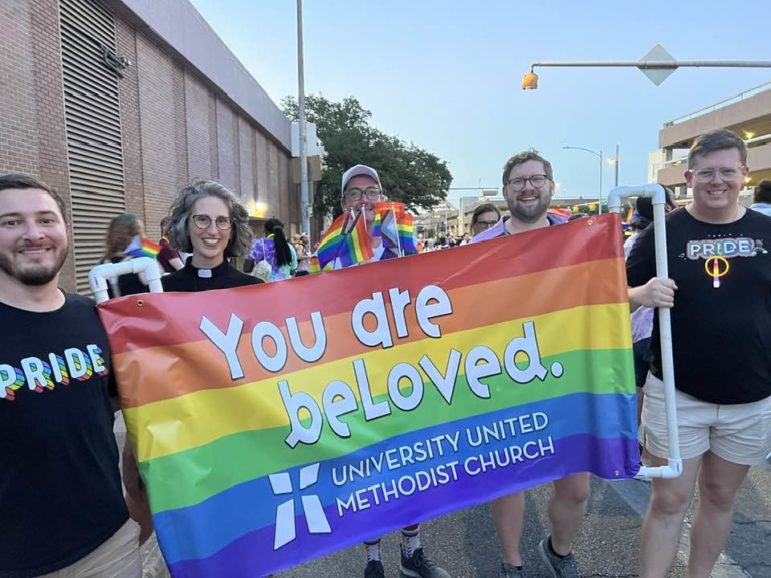
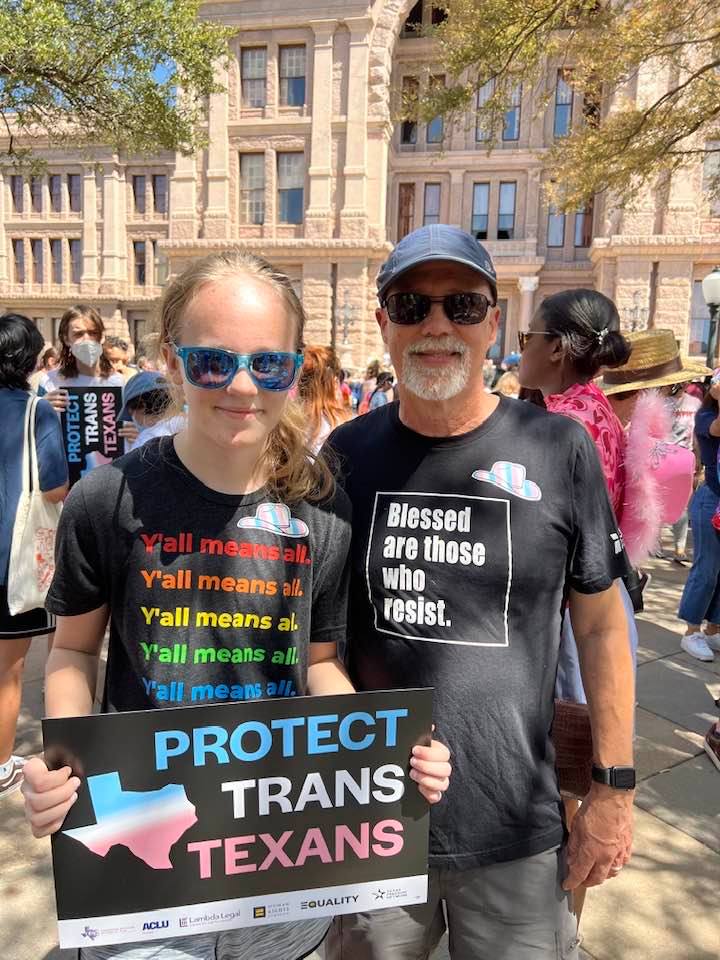
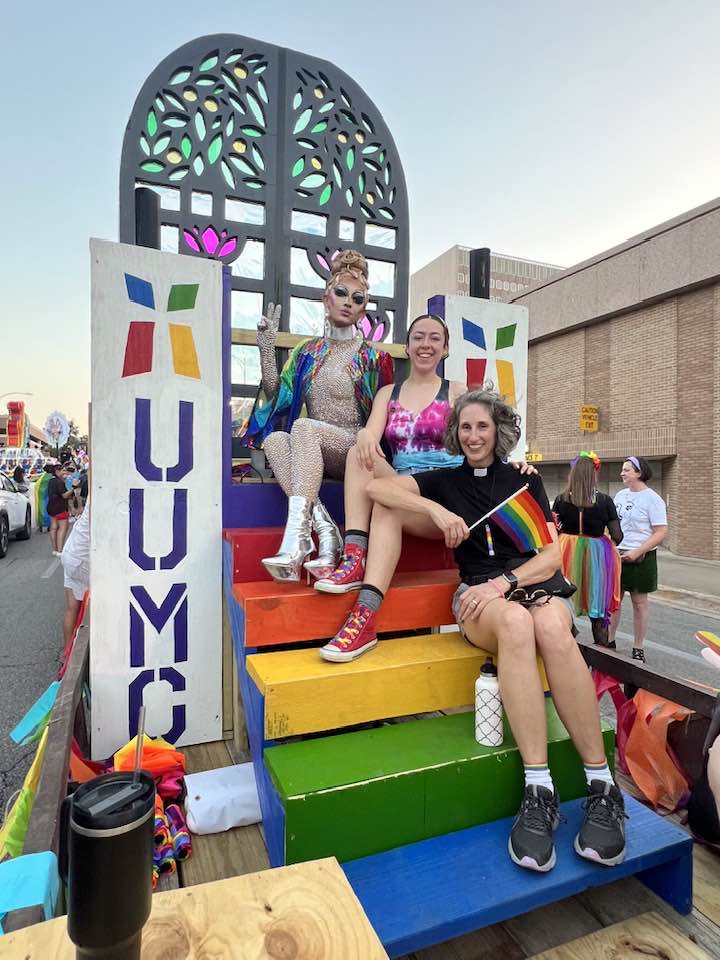
Regarding scriptural support for LGBTQIA+ inclusion, for us, it starts right at the beginning of the Bible in the book of Genesis when God created humans:
“God created humanity, called all good, and believed that the divine spark is alive in every person.”
I also love that in the creation story, God is referred to as “they.”
We believe that every person has sacred worth.
All people are beloved by God. As people following Jesus, we receive Jesus in the scriptures and through our own life experiences. Jesus always drew the circle of inclusion wider and certainly had a heart of wanting to connect with people who were otherwise underrepresented in society.
So when we look at what’s happening in our world through that lens, how can we not be concerned about the harm that’s being done to members of the LGBTQIA+ community, immigrants, and refugees?
Micah 6:8, “God has shown us what to do,” to me means we should be kind, show mercy, journey humbly with our God, and do justice. Those are scriptures that I return to over and over.
We have to keep reading scripture and experiencing life with other people in God’s world—God is about inclusion and drawing people in.
In the United Methodist tradition, the Wesleyan Quadrilateral guides everything from our interpretation of scripture to our understanding of who God has called us to be in the world and how to relate to all of creation. The Wesleyan Quadrilateral consists of scripture, reason, tradition, and experience.
So you can say “scripture says this, scripture says that,” but also what makes sense? What is reasonable? What does our tradition say? And then there’s experience. Many progressives have found that people are often our best teachers when it comes to who God is.
We can find God’s presence in people. So that experience piece is really important for United Methodists.
I also find that the Quadrilateral illustrates the intersection between our support for reproductive freedom and the concerns of the LGBTQIA+ community. In both cases, a fundamental value is bodily autonomy.
God created every person, and we follow Jesus who came to us in flesh and bone. There’s something about the body that matters, and the divine spark is in every person. The despicable desire to control another person’s body is very counter to a Jesus who was all about freedom, liberation, and valuing the body and our agency.
Now that we’re in a time when transgender rights, LGBTQIA+ rights, and reproductive freedom are under attack in more overt ways, do you think people in faith spaces and congregations have felt more compelled to have these hard conversations and make clear their values on these social issues?
Speaking for myself, absolutely. Following the Dobbs decision, several of us attended protests at the Texas Capitol to be visible faith leaders there.
We’ve been methodical about our designation as a Reproductive Freedom Congregation with Just Texas. We want to be sure we’re having the necessary conversations so that the designation is more than a rubber stamp saying we’re a progressive congregation—it means we’re taking action.
We want to make sure we all agree on what it means to be a safe place for women and people who can get pregnant to have the support they need.
What’s going on at the Texas Legislature has shown us we cannot be silent.
Members of our Just Texas community, like Rev. Welborn, consistently show us that the religious right does not speak for all faith communities.
The 2025 Texas Legislative Session will be here soon, and bill filing starts in November. We know the religious right will weaponize faith to attack our freedoms — freedom over our own bodies, the freedom to read and teach the truth in our public schools, our freedom to safely live as our full selves within the LGBTQIA+ community, and so much more.
YOU can take action by becoming a voter! Early voting starts Monday, October 21, and lasts until Monday, October 28. Election Day is November 5! Learn more about being a voter at tfn.org/vote.
To sign up early for our legislative alerts and become a legislative leader, visit tfn.org/lege.
